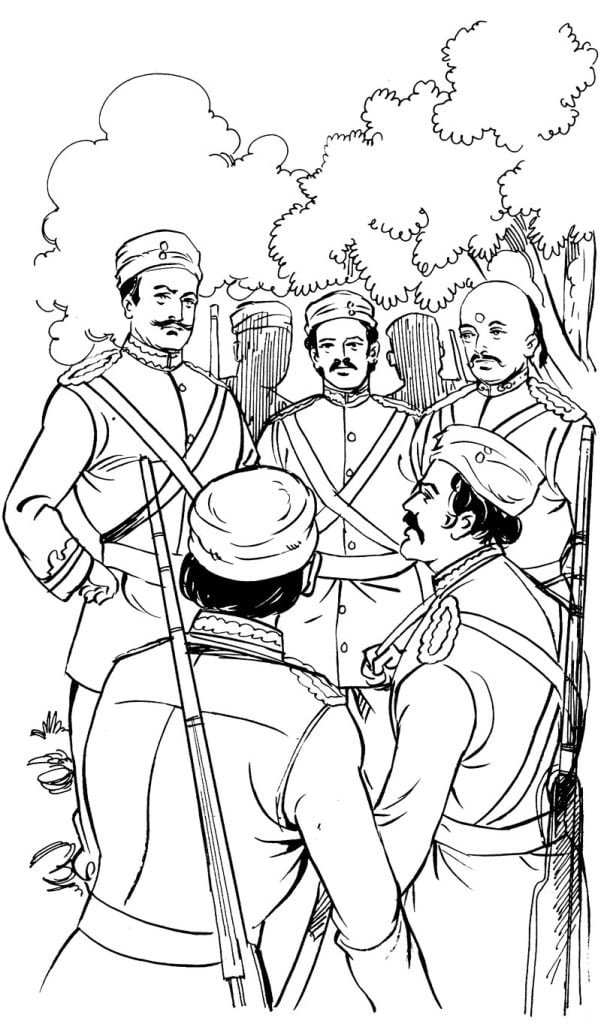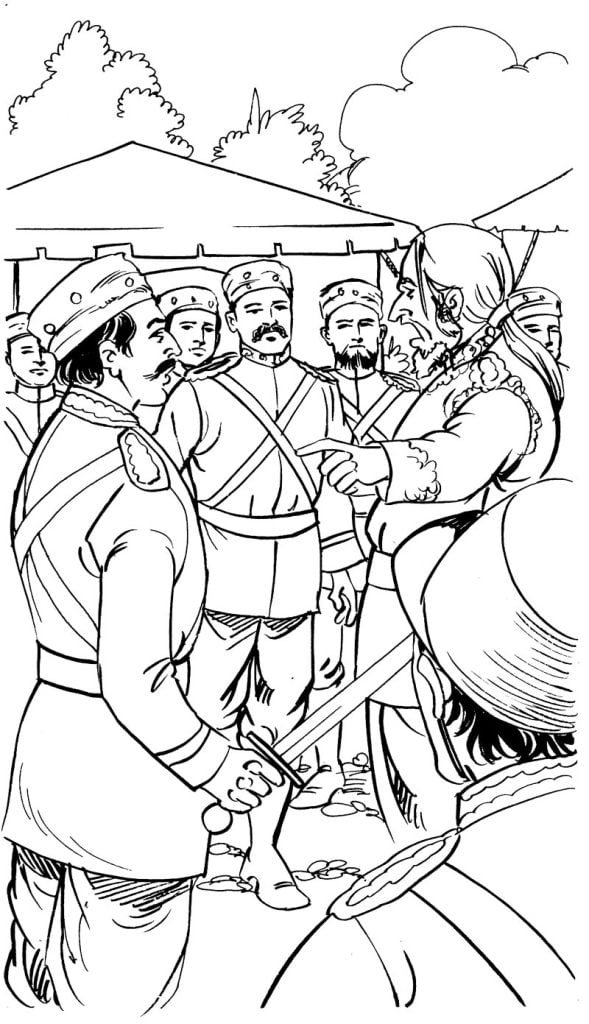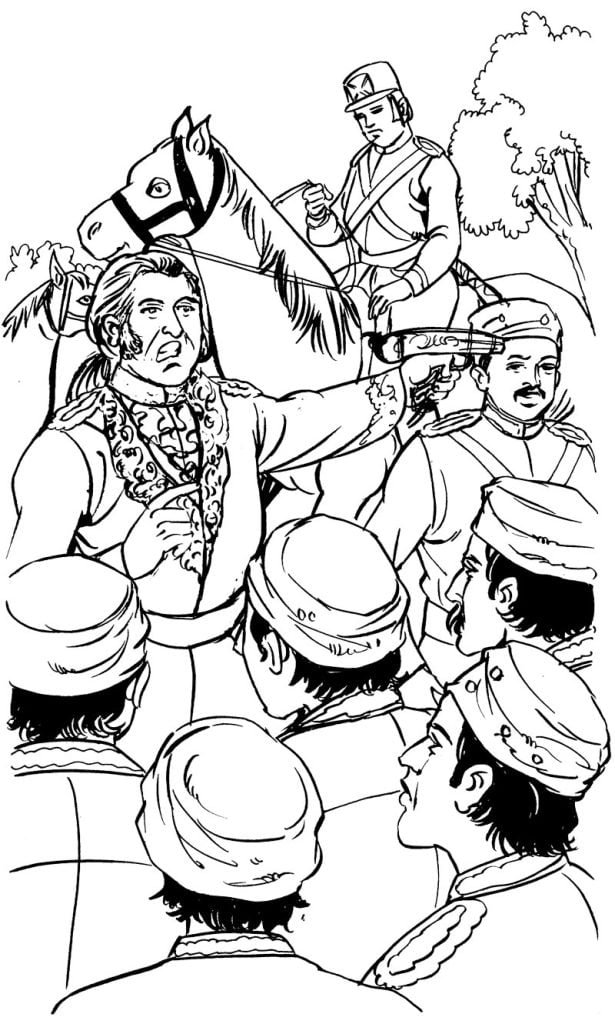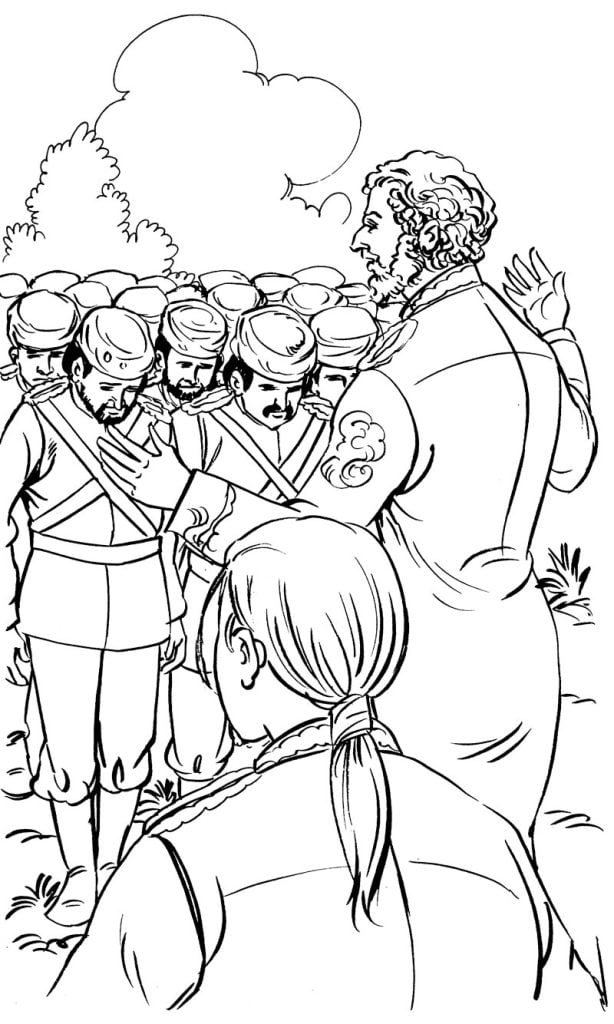The news of the dismissal of 19 Regiment sepoys reached to all the garrisons and cantonments of the company army including Meerut where 34 Infantry Regiment of Mangal Pandey was now stationed. The British did not want to keep it a secret. Infact they wanted it known to all native sepoys as a warning against the disobedience and indiscipline.
The sepoys were not happy about it. They talked about it among themselves.
Havildar Lalchand said clenching his fists, “What they are doing is no good. There was no need to dismiss all those poor sepoys. The officers could have understood how touchy the issue of the fat was for the native sepoys whose religious sentiments were attached to it. I happen to know that insensitive and vindictive bastard, the Commanding Officer Michael.’’
Mangal agreed, “Why do they not understand our feelings? It was simple. They could have given proof and convinced us that the cartridge wrappers did not contain any fat as they claim. If it is wax paper they can easily prove it. Why don’t they try it?’’

A sepoy added, “Yes, why don’t they? Their behaviour makes us more suspicious. Is there something that they have to hide? Friends, I now think there is some objectionable thing in those wrappers. They are trying to silence us with the threat of the dismissal.”
“Today it is the sepoys of 19 Regiment. Tomorrow it will be us. Mark my words,” another spoke.
Mangal Pandey gnashed his teeth saying, “We are not going to cow down before threats. We have to defend our dharma, our very soul. Firangis can not force us. We must prepare for the do-or-die battle. The whites don’t know the power of our commitment to our dharma.”
Lalchand spoke, “That is right. If they do to us what they did to 19 Regiment then we are not going to go down without a fight. They can take away our jobs, our lives but we won’t allow them to take away our dharma. They won’t be able to fool us.”
“We must at once raise the banner of revolt in entire cantonment barracks. What are we waiting for?” sepoy Jahandar Bhai said.
Mangal supported him, “Yes, why not? Things will become difficult for us when the British troops arrive in India from Rangoon.”
Havildar Lalchand shook his head. “The date of uprising has already been fixed for 31st May all over Hindustan by the rebellion leaders. We should not upset that, keep patience till then. One mighty blow suddenly dealt will floor the enemy. In that way as soon as the uprising succeeds we can hope to be absorbed in the national army of the Emperor Bahadurshah Zafar.”
All the above discussion was taking place in the barracks of the 34 Infantry Regiment. It was the month of March, 1857. The day was when Hindus celebrated the festival of colours, Holi and it was an official holiday. No parade was scheduled on that day. Some of the sepoys had made a programme of traditional bhang drinking. (Bhang—Cannabis ground to paste mixed in sweetened milk—a mild intoxicant) The sepoys welcomed the idea as it could provide some relief from the tension they had been living in for months due to cow-pig fat issue. The bhang makers brought the pitcherfuls and the sepoys drank a glass each of it. It made them feel a bit excited.
A sepoy again picked up the discussion in charged up mood, “So,…when are we starting the rebellion?”
“Not before 31st May because we have no time to send message to all,” Lalchand reminded.
Mangal Pandey disagreed, “I think we must start right away. Once we do others will be forced to join us irrespective of what date has been set for the uprising. We should not wait.”
“I think Mangal is right. What is the use of the uprising if firangis destroy our dharma before that? Why give them a chance?”
Jahandar Bhai opined, “ It is not in our hands brother. Firangis would push us into it anyway.”
“What do you mean?” Lalchand asked.
“Suppose tomorrow the drill captain asks us to handle those fat smeared cartridges what would you do? We shall either have to refuse to do so or obediently handle the cartridges. I am going to refuse anyway. Tauba, Tauba!! Never shall I do that even if they cut my throat. Now Mangal bhai, tell me would you put your teeth to those cowfat greased cartridges?”
“No!” Mangal screamed and hissed, “Whoever tries to force those cartridges on me I will put my bayonet through his chest.”
“That does it. We can’t wait, brothers for the 31st May to arrive.”
Mangal clenched his fists saying, “Jahandar Bhai is dead right. The very tomorrow will test the truth of our commitment to our dharma. 31st May is meaningless for us. We have no time to lose. We must make our move right away. What say you, my friends?
“We are with you!” the most of the sepoys raised their hands up.
“There would be no use crying over spilt milk. Now we will see how many of us have suckled mother’s milk. Dharma is calling you for action, friends! Let us go!”
The sepoys ran to pick up their arms.
Little did they know that one blackship among them had stealthily slipped away and had run to the British superiors to inform that Mangal Pandey was inciting the sepoys for mutiny.
The traitor sepoy reported to Sergeant Hueson about the scheming sepoys. He also revealed the names of the main plotters. The Sergeant sprang to his feet and said to the informer, “Good work sepoy. You will get bakshish and promotion for your loyalty. Now run to the Lt. Adjutant Mr. Waugh and tell him about the conspiracy. Meanwhile I will get ready.”

On the other side Mangal Pandey was emerging out of the barracks followed by other frenzied sepoys. They were all in arms and were going to regroup in the parade ground infront of the barracks.
Havildar Lalchand was still trying to calm them down. He was saying, “Mangal! Try to understand that our pre-empting the 31st May uprising will prove self destructive. It will ruin the plans of the people who are working up Roti-Kamal revolution.”
“Come on, dadu! We have no time to lose. We must get them before they get our teeth on cow-fat. Are you turning a chicken?” Mangal challenged.
Lalchand shook his head in frustration. Then, he sighted the British officer galloping in on a horse. He warned, “Attention Mangal! I think. Waugh is coming!”
“You pay attention to Waugh, Havildar. The sepoys will pay attention to me. Friends, stand your ground! Don’t be afraid of the firangi officer. We shall deal with him like an enemy. Get ready!” Mangal Pandey angrily shouted.
Although the sepoys were emotionally with Mangal Pandey yet the sight of the officer Waugh chilled down their anger and the frenzy. The realisation of their need to retain the employment began to sink in them as their lives were abject poverty ravaged.
Waugh screamed at Mangal, “You traitor sepoy!”
Already feeling let own by his own people, the cry of the officer Waugh infuriated Mangal Pandey. His blood boiled and his gun spat a bullet in the direction of Waugh. The bullet went into the neck of the officer’s horse. The mount and the mounted came down to the ground.

Officer Waugh gathered himself smartly and fired at Mangal with his service pistol. The bullet missed the target. The officer drew out his sword and ran at the rebel, Mangal Pandey.
Mangal began to defend himself with his bayonet. But Waugh was expert fencer. He made swift charges putting Mangal on the backfoot. With every swing of the sword the officer was gaining on the defensive Mangal. In desperation Mangal began to use his gun as a lathi. He was able to hit away the sword of Waugh. A ramming charge of the gun butt brought Waugh down.
Just as Mangal was preparing to stamp Waugh’s head with his gun butt Sergeant Hueson arrived on the scene. He kicked away the gun of Mangal Pandey.
Mangal screamed, “Sergeant! If you dare then fight with me with bare hands!”
“Sepoy! It is not your village mela game. It is military affairs. You are a traitor sepoy and you will be tried for that offence.” Then he looked at the other sepoys and said, “I order you to arrest this traitor who I am told is Mangal Pen-day (Pandey).”
For a few moments there prevailed silence. No one moved. Then, Havildar Lalchand came forward and he held the right hand of Mangal by the wrist announcing, “You are under military arrest.” He whispered to his prisoner, “That is what I warned you against, Mangal. I must arrest you for the ‘Roti-Kamal’ plan.”
Mangal stared at him suspiciously.
Then, suddenly Mangal freed his hand with a jerk and spoke, “Dadu! I didn’t know that you were such a yellow belly! You are betraying our mission to defend our dharma.” Then, he yelled to the sepoys, “Brothers! Stand firm on what we decided. Don’t behave like a flock of sheep. We must teach these firangis what happens when our dharma is put at stake! Don’t cower before two helpless firangi officers. Move and get them!”

No sepoy moved to the chagrin of Mangal Pandey. He gave a disgusted look to every one.
Meanwhile Waugh and Hueson had slipped away taking advantage of the prevailing confusion. But Colonel Whelon had arrived to take charge of the situation and win back the sepoys.
He addressed the sepoys, “On principle all humans are equal in this world. But God has granted different levels of power and intelligence to each one. So, the powerful and more intelligent humans have the right to guide and rule over the lesser gifted. One who steps out of line is a traitor. That is what your Mangal Pandey has done. So, I order you to arrest him.”
His speech made no impression on the sepoys. They stood still stupefied with bent heads. They did not oppose the Colonel but neither did they obey him. Colonel Whelon gave up and went to the Station Brigadier, Charles Grant to report the matter.
The British authorities had got wind of the rebellious atmosphere building up in garrison and the countryside. They were taking steps to defuse the situation but had not anticipated it to get sparked off so soon. Charles Grant heard what Whelon had to say in utter surprise.
Offices Grant was a respected person among the native ranks. Almost friendly to the sepoys he was and was not prejudiced against the Indian culture. Infact, he liked it. Charles Grant could speak fluent Hindustani language. The sepoys used to pay attention to what he had to say.
His arrival in the parade ground failed to change the situation. The sepoys stood respectfully to him but remained frozen in inaction. They were like frozen spectators to whatever drama was being enacted by Mangal Pandey and the British officers. Put off by the unresponsive mood of the sepoys Grant withdrew.

As he departed Mangal Pandey again tried to whip up the dharma passions of the sepoys. He challenged their courage and the commitment. But the sepoys did not react to the despair of the rebel Mangal.
Then, Major General B. Hearsy rode in on a horse. He was accompanied by his two sons who were also military officers in the ranks of a captain and a lieutenant. They were also on horse backs.
The sight of the Major General made the sepoys squirm. Hearsy had been commanding those sepoys from the Barrackpore days. He knew every face and the sepoys held him in awe. Major General was a no-nonsnese officer and a strict disciplinarian.
Charles Grant had briefed him on the situation. The three mounted officers rode around circling the assembled characters. The sepoys did not physically react. Mangal Pandey just stood and watched. Hearsy just went on surveying the field without issuing any command. His sons followed him silently.
Suddenly, Hearsy got off his horse and walked to the Quarter Guard. He whipped out his revolver and held it against the temple of the guard.
Hearsy warned loudly, “I will blow his brains out and also shoot that rebel traitor if you do not obey my command to march.”
The sepoys stared at him in horror.
“March!” Major General Hearsy’s authoritative voice cracked in the air.
It worked. The sepoys got snapped out of their stupor. They reacted like robots and fell in line. The sepoys were now marching in orderly rows just like in the routine drill. The military habit of discipline and obedience had regained control over the minds of the sepoys. They were reacting mechanically.

Mangal Pandey stood frozen and watched the scene in utter dismay and humiliation. He made up his mind not to obey the firangi orders come what may. He did not join the marching robots. Mangal knew that his game was over and he could be arrested any moment whenever Hearsy ordered. He shuddered at the thought of the horrors he would have to go through after his arrest. Mangal Pandey muttered under his breath, “I won’t give these firangis the satisfaction of putting me through the shame of the military court trials and treating me as a despicable traitor. He had decided to take his own life as it looked more honourable death.
He put the muzzle of his gun to his chest and pulled the trigger with his toe. The gun boomed and Mangal Pandey fell down. But unfortunately for him the bullet failed to do the justice of giving him the honourable death. He was merely injured.
Major General stared in the direction of the gun shot. He spotted the collapsed figure of the rebel sepoy. He commanded the sepoys to keep marching around until further orders.
At his signal, his sons rushed to the fallen figure and they examined Mangal Pandey. One of them said, “Sir, he is not dead. Injured he is.”
“How serious?” Hearsy asked.
“It is serious but he will live if given proper treatment without waste of time, sir.”
Hearsy commanded, “Remove him to garrison hospital at once. Get someone to bring the stretcher. I want him alive. He must not die.”
By then all the other officers had returned to the parade ground.
The news of the mutiny by the sepoys of the 34 Infantry Regiment spread around like wild fire. All the cantonment and military garrisons were agog with the news of Mangal Pandey and his band of rebels. It fuelled the minds of the native soldiers of the army.
Now it became known to all that the new consignment of cartridges manufactured in England were greased with cow and pig lard. No one was trying to find out the truth about it. For the rumour mongers it became a handy item. That made it a point to impress upon the people how the British were deliberately playing with the religious sentiments of the natives. It made the people hate firangis more then before.
Virtually now the fat was in the fire.
The native sepoys of the military became ever more incited and frustrated. The civilians were taunting them. The discriminatory treatment meted out to the native soldiers were coming into their minds in sharper focus. Their grievances against the white superior were increasing.
As the British authorities exercised more control and stricter disciplinary measure in the garrisons the native soldiers found more reasons to complain. The dissatisfaction was spreading dangerously fast.
The events at Meerut and other garrison towns caught the ‘Roti-Kamal’ uprising planners by surprise. They were not ready for such sudden developments. Now they too could not wait for 31st May, the earlier fixed day for the mass uprising. It had become necessary to advance the date to take advantage of the revolts and the mutinies taking place in the Company’s army.
Zeenat Mahal thought that synchronising the civilian mass uprising with the soldier rebellions could prove too handful for the firangis. They would find it impossible to battle on two fronts at the same time.
Begum Hazrat Mahal agreed with her. She hoped that the British would be forced to dismiss more military units in the following days who could be invited to join the uprising to lend it more teeth. That end could only be achieved by advancing the date of the civilian uprising to tap the anger of the soldiers.
It was agreed that 1st May would be the correct time for the uprising. Mangal Pandey through his act had unwittingly sparked off the anti-British uprising. The Roti-Kamal revolution planners had no objection to projecting the rebel soldier Mangal Pandey as a hero to incite the masses and to fuel their imaginations.
It was obvious that Mangal Pandey would be tried in the military court and no one had any doubt about the outcome of the trial. He would be hanged or shot dead.
The month of April was going to be very crucial for the uprising. It was anticipated that Mangal would be tried and executed in that month which could be used to arouse the feelings of the people against the colonial rulers, their injustices to the natives and the cruelties they were perpetrating on Hindustanis.
The whole of the April could be used to build up the anti-British atmosphere. All the native soldiers would be keenly watching the trial of Mangal Pandey and his eventual fate with baited breath. Their anger against the British would be constantly on the rise. Many of the native soldiers could become too excited or too aggrieved to hide their feelings which would result in more defiant acts against the white officers inviting more dismissals and court martial. The situation would further aggravate to the disadvantage of the British. Their disadvantage will become the advantage of the uprising.
Thus, the propaganda was rescheduled to build up the pressure to reach at flash point by the 1st May, 1857. Meanwhile, Mangal Pandey was treated in the Meerut garrison hospital and brought to health for the trial in the quickest possible time.
A couple of days later, he was tried in the military court on the charges of the treason against the British East India Company Government and for physical assault on his military superiors. Mangal Pandey was not given any chance to defend himself. The prosecution pleaded for the exemplary punishment. The military judge duly obliged. Mangal Pandey was sentenced to death by hanging.
On 8 April, 1857 Mangal Pandey was hanged in the presence of the entire regiment in the parade ground.
On 21 April, 1857 Zamadar Ishwari Prasad was hanged on the same charges.
The entire trials were gone through only five weeks.
The rest of the sepoy’s and higher ranks of 34 Infantry Regiment were ordered to lay down their arms and all the soldiers were dismissed from the service.
Thus, the brave Mangal Pandey embraced death for the sake of his native pride and values in the wake of which 1857 uprising got triggered off.
